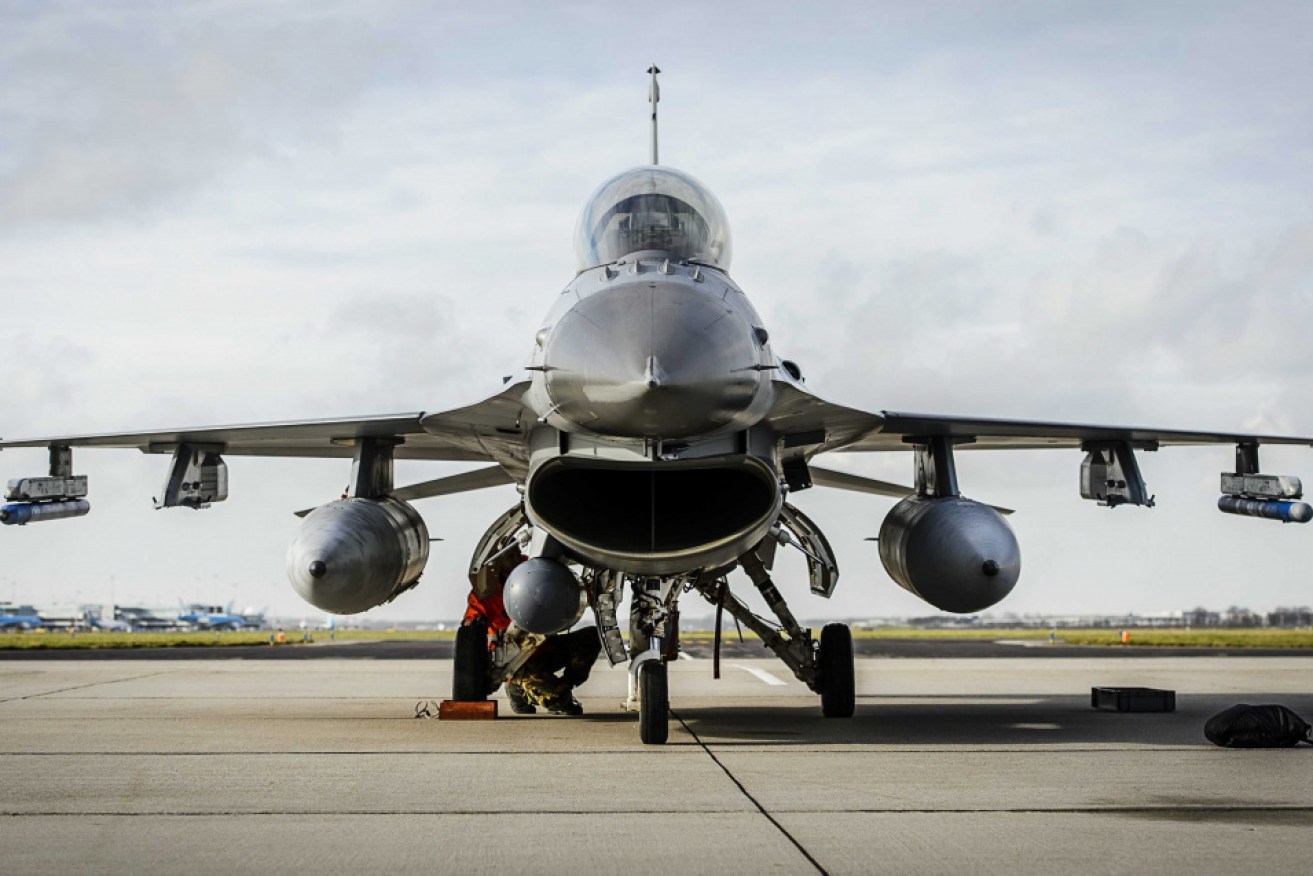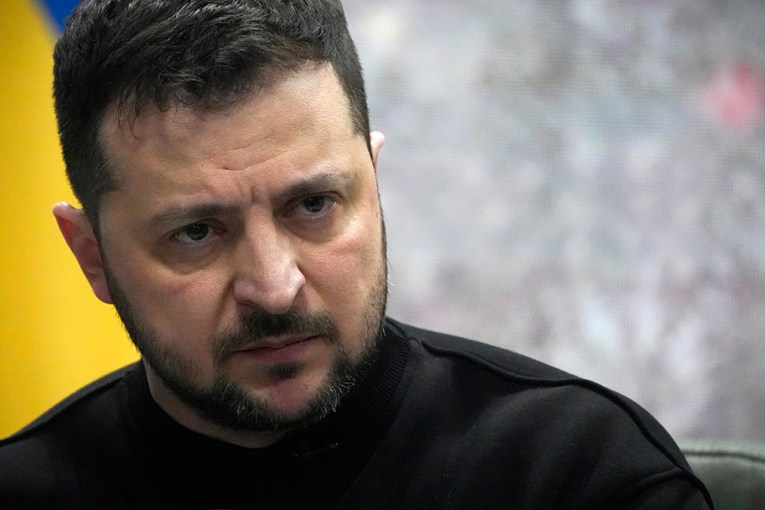Trump administration approves an $8 billion F-16 fighter jet sale to Taiwan

The Biden administration has OK'd the transfew of F-16 air-superiority fighters to Ukraine. Photo: AAP
The Trump administration is moving forward with an $8 billion sale of F-16 fighter jets to Taiwan, according to US officials on Friday.
The move is certain to further anger China at a time when a long-running trade war between Washington and Beijing has upended relations between the world’s two largest economies and contributed to stock market turmoil.
The sale of 66 jets to Taiwan would be the largest or one of the largest single arms package transactions between the United States and the democratic, self-governing island.
The State Department told Congress on Thursday night, right after Secretary of State Mike Pompeo had signed a memo approving the sale, officials said.
Congress is not expected to object to the move.
For weeks, lawmakers from both parties had accused the administration of delaying the sale to avoid jeopardising trade negotiations or to use it as a bargaining chip.
But trade talks in Shanghai at the end of July led nowhere, and President Donald Trump said earlier this month that the United States would impose a 10 per cent tariff on an additional $300 billion ($442 billion) worth of Chinese imports on September 1.
He then partly reversed himself over concerns about the impact on Americans.
He decided on August 13 that he would hold back on tariffs on consumer goods until after the start of the Christmas shopping season.
Mr Trump’s national security adviser, John Bolton, a foreign policy hawk, has been a longtime advocate of arms sales to Taiwan and has pushed for greater US support for its government.
Some analysts suggest China could retaliate by punishing American companies with sanctions, which it did last month.
On Friday, a Chinese Foreign Ministry spokeswoman, Hua Chunying, was asked at a news conference in Beijing about the potential sale of fighter jets, hours before the news emerged of Mr Trump’s final decision.
She said the United States was violating China’s sovereignty and interfering in its internal affairs with arms sales to Taiwan.
She said that Beijing would take unspecified “countermeasures” and stressed that the United States would be responsible for the consequences.
The decision to proceed was first reported on Friday by the Washington Post.
Communist Party officials in Beijing have strongly objected for months to the package, which has been a long-standing request from Taiwan.
Chinese leaders have insisted for decades that they will reunify Taiwan with China. Taiwan has had de facto independence since 1949 and is supported by the United States.
As American administrations normalised diplomatic relations with China, Congress passed the Taiwan Relations Act of 1979 to set legal guidelines for ties with Taiwan.
The act says the US government must “provide Taiwan with arms of a defensive character.”
The department gave informal notification of the sale on Thursday to the Senate Foreign Relations Committee and the House Foreign Affairs Committee.
Once those committees tell the department to move ahead, which would probably happen within days or weeks, the agency would give formal notification to Congress and await any objections within 30 days.
Trump administration not the first to sell arms to Taiwan
The jets would be the fourth package of arms sales to Taiwan from the Trump administration. The first two packages totalled less than $2 billion ($2.9 billion).
On July 8, the Trump administration told Congress it was moving ahead with a $2.2 billion ($3.2 billion) package that consisted mainly of 108 M1A2 Abrams tanks.
In his first term, President Barack Obama approved two large packages worth a total of $12 billion ($17 billion), then moved on sales of less than $2 billion in 2015.
President George W Bush approved packages worth less than $5 billion ($7.3 billion) total in his first term, then pushed through sales worth more than $10 billion ($14.7 billion) in his second term.

Taiwanese Air force F-16 fighter jets fly in formation as they drop anti-missile deterrents during the second day of the annual Hankuang military exercises in 2007. Photo: AAP
All recent administrations have taken into account the timing of arms sales to Taiwan in order to avoid upsetting Beijing at critical moments.
“There is never a good time to sell arms to Taiwan, but this timing is probably the worst possible choice,” said Evan Medeiros, professor in Asian studies at Georgetown University and senior Asia director on Obama’s National Security Council.
“Trade talks will stall, China will try to hit American companies hard and Chinese will see a conspiratorial link between US support for Taiwan and Hong Kong.”
Hong Kong riots
The Chinese government has blamed the United States for the pro-democracy protests in Hong Kong, though Mr Trump has not made any strong statements in support of the protesters.
Bolton has forcefully warned Beijing against any potential crackdown.
He and other senior foreign policy advisers have urged Mr Trump to declare a similar position on humanitarian grounds. Lawmakers from both parties and policy experts have also called for the president to advocate human rights.
“President Trump should not be equivocating on this,” said Kelly Magsamen, a senior Asia policy official in the Pentagon during the Obama administration.
“He should be using the power of his office to press Xi Jinping to avoid a violent escalation. Instead, he’s sending all the opposite signals and pretending he has no influence.”
Mr Trump’s top foreign policy aides generally see China as the greatest strategic rival to the United States and advocate aggressive positions.

Mr Trump meets with Chinese President Xi Jinping during a meeting on the sidelines of the G-20 summit in Japan. Photo: AAP
Mr Trump has a transactional view of China and is focused almost entirely on narrowing the trade deficit. He has said China and the United States are “strategic partners” and expresses admiration for Xi, saying they “will always be friends.”
At the urging of officials concerned about the trade talks, the administration has refrained from enacting sanctions against Chinese officials deemed responsible for the detention of one million or more Muslims. Human rights advocates are pressing the administration to move ahead with those.
Some analysts said despite the growing acrimony, Washington and Beijing might be able to keep the dispute over the Taiwan arms sales separate from the difficult trade negotiations.
“China will condemn the sale, of course,” said Bonnie Glaser, senior Asia adviser at the Centre for Strategic and International Studies.
“But Beijing’s objections are primarily political, not military. This will not likely derail the trade talks unless China is looking for an excuse to not hold them.”
-NewYorkTimes







